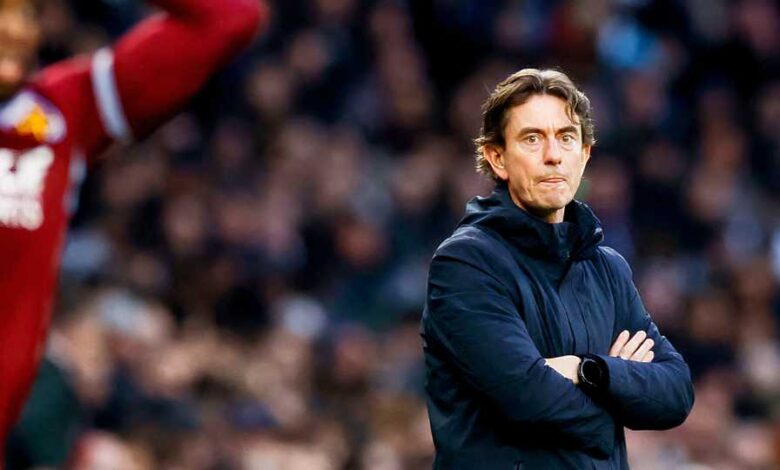“Being completed” – Sky journalist shares more bad news for Tottenham after deadline day claim


Tottenham Hotspur have been dealt another damaging setback in the transfer market after receiving a decisive update on one of their long-term targets, a development that underlines just how difficult the past few months have been for the club both on and off the pitch. A clear message delivered on deadline day has now been followed by confirmation that Spurs are set to miss out on the player not only this winter, but potentially for good.
Thomas Frank’s first season in north London has been anything but smooth. Spurs have struggled badly in the Premier League and currently sit in a disappointing 14th place after a nightmare opening half of the campaign. Injuries to key players have ripped the heart out of the squad, leaving Frank repeatedly forced to improvise with makeshift solutions and undercooked options. The lack of depth and quality in several positions has been brutally exposed, making January a crucial window for reinforcements.
Despite that urgency, Tottenham’s transfer business ultimately failed to live up to expectations. The club did complete a £35 million deal for Conor Gallagher from Chelsea, a signing that brought much-needed intensity, leadership and Premier League experience into midfield. They also added left-back Souza for around £13 million, a move seen as one for both the present and the future. However, beyond those two additions, Spurs’ plans quickly began to unravel.
January proved frustrating across the board for the Lilywhites. Behind the scenes, the recruitment team explored several options and held discussions over multiple targets, but very few of those ideas translated into concrete deals. Attacking reinforcements were a priority, with Tottenham closely tracking Monaco playmaker Maghnes Akliouche throughout the window. Months of groundwork had been laid, yet the club ultimately decided not to follow through with a formal approach, leaving fans questioning whether ambition once again fell short of reality.
There was also late optimism surrounding a potential move for Liverpool stalwart Andy Robertson. Spurs reportedly reached an agreement in principle over a £5 million fee, a bargain for a player of his pedigree and experience. However, the deal collapsed at the final hurdle, with neither Liverpool nor the Scotland international providing the final green light. It was another example of a transfer that came close but never crossed the line.
Now, further disappointment has emerged in the form of Bayern Munich defender Dayot Upamecano. According to reports, Tottenham were informed on deadline day that the French centre-back — who has been on the club’s radar for a long time — would not be joining them this year, despite his contract being due to expire in the summer.
Frank’s side were not alone in their interest. Chelsea and Liverpool were also monitoring Upamecano’s situation, but all three Premier League clubs were told the same thing on Monday: the Bayern defender had no intention of leaving and was instead focused on securing a contract extension in Germany.
This update will sting Spurs supporters even more given recent reports from Argentina suggesting Cristian Romero is set to depart the club this summer. With Romero potentially on his way out, Upamecano would have represented an almost perfect replacement — a proven elite defender, entering his prime, and potentially available on a free transfer.
Any remaining hope Tottenham may have had has now been extinguished. Sky Germany journalist Florian Plettenberg has confirmed that Upamecano is in the final stages of agreeing a new deal with Bayern Munich. The north London club, along with other Premier League heavyweights, can now do little more than watch from afar.
Upamecano has been a cornerstone of Bayern’s defence since arriving from RB Leipzig in 2021 for £38 million. He has made 178 appearances for the Bavarian giants, collecting three Bundesliga titles along the way and establishing himself as one of Europe’s most physically dominant centre-backs. His pace, strength and comfort in possession would have made him an ideal fit for Tottenham’s high-risk, high-line system.
Instead, Bayern’s decision to lock him down long-term slams the door shut completely. Upamecano has clearly committed his future to Bavaria, bringing an end to any lingering speculation about a move to north London.
For Spurs, it is another major target crossed off the list and another reminder of opportunities that slipped away. With the squad stretched thin, defensive reinforcements desperately needed, and key players potentially heading for the exit, the failure to secure top-level additions could have serious long-term consequences.
As the season continues to drift, the pressure on Thomas Frank grows heavier by the week. Results remain inconsistent, confidence is fragile, and the lack of January backing only adds to the scrutiny surrounding his position. For a Tottenham side crying out for quality, leadership and stability, this latest transfer blow feels like yet another step backwards.